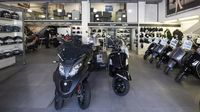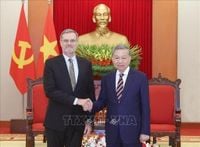On April 17, 2025, significant developments unfolded in both the defense and automotive sectors in France, marking a period of strategic partnerships and economic challenges. In the realm of defense, Emmanuel Chiva, the Deputy Chief of Staff of the French Army, opened the door for enhanced cooperation between France and Germany regarding armored vehicles. This initiative is seen as a precursor to the upcoming Main Ground Combat System (MGCS) program, which aims to deliver much-needed medium tanks to the French Army. However, financial constraints have led the French government to reconsider its defense spending, potentially impacting the procurement of German Leopard 3 tanks. This situation raises questions about the future of France's tank manufacturing capabilities.
Chiva's remarks highlight the urgent need for the French Army to modernize its armored capabilities amid rising geopolitical tensions. While Germany remains a key partner in this endeavor, the potential for collaboration extends beyond Europe. France is exploring partnerships with countries like the United Arab Emirates (UAE) and Egypt to design and produce advanced Leclerc tanks. This collaboration could serve as a significant asset for French defense, providing both technological expertise and financial investment.
However, challenges remain. The French defense industry faces hurdles in developing its own medium tank models, particularly as Germany advances with the Leopard 3 project. The question of whether France can maintain its technological expertise in tank manufacturing while navigating these financial constraints looms large. As the global military landscape shifts, the need for robust defense capabilities becomes increasingly critical.
In a different but equally impactful arena, Vietnam is strengthening its ties with France. On the same day, Olivier Brochet, the French Ambassador to Vietnam, was received by Party Secretary General To Lam in Hanoi. During their meeting, Lam emphasized the importance of France as Vietnam's first strategic partner in the European Union (EU), reflecting Vietnam's commitment to deepening cooperation across various sectors.
Brochet reiterated France's ambition to enhance collaboration with Vietnam, particularly in defense. He acknowledged Vietnam as a key partner in the Asia-Pacific region and expressed a desire to promote bilateral trade and investment. The discussions also touched on the EU-Vietnam Investment Protection Agreement (EVIPA), with Brochet advocating for its swift ratification by the French Parliament. This agreement is expected to bolster economic ties between the two nations, especially as global trade faces numerous challenges.
Despite the promising diplomatic developments, the automotive market in France is grappling with a downturn. Recent data from Solly Azar-AAA Data indicates a significant decline in motorcycle sales, with new registrations dropping from 61,054 in the first quarter of 2024 to 47,356 in the same period of 2025—a staggering 22% decrease. This decline is particularly pronounced in the motorcycle segment, which has seen a broad downturn across all categories.
Specifically, sales of motorcycles under 50cc fell by 26.4%, while those over 125cc experienced a decline of 20.4%. The three-wheeled motorcycle market was hit hardest, with sales plummeting by 45.3%. Even the second-hand motorcycle market, which typically remains resilient during economic downturns, saw a 20% drop in sales. Experts attribute this trend to several factors, including changing consumer behaviors, stricter regulations, and the introduction of Euro 5 emissions standards.
The Euro 5 standard, which came into effect on January 1, 2025, aims to regulate vehicle emissions and promote environmental sustainability. However, it has also created challenges for manufacturers, as they rush to sell older models that do not meet the new standards. This regulatory shift has complicated the purchasing process for consumers, prompting many to delay buying new motorcycles.
Moreover, the rise of alternative transportation options, such as electric scooters and small cars that do not require a license, has further impacted motorcycle sales. Young consumers, particularly from affluent families, are gravitating towards these alternatives, which may offer greater convenience and environmental benefits.
Legal requirements, such as annual vehicle inspections and low-emission zone regulations in urban areas, have also made motorcycle ownership less appealing. In Paris, new parking fees for motorcycles, aligning them with car parking costs, have added to the burden on potential buyers. Despite these challenges, some industry experts remain optimistic, noting that digital sales have performed well, suggesting a potential shift in consumer purchasing patterns.
As France navigates these complex dynamics in both defense and automotive sectors, the interplay between international partnerships and domestic economic challenges becomes increasingly critical. The collaboration with the UAE and Egypt in defense manufacturing could bolster France's standing in global military capabilities, while the ongoing decline in motorcycle sales highlights the need for innovative solutions in the automotive market.
In summary, the developments on April 17, 2025, reflect a pivotal moment for France as it seeks to strengthen its defense capabilities through international partnerships while grappling with significant economic challenges in the automotive sector. The outcomes of these initiatives will likely shape France's strategic landscape in the years to come.






